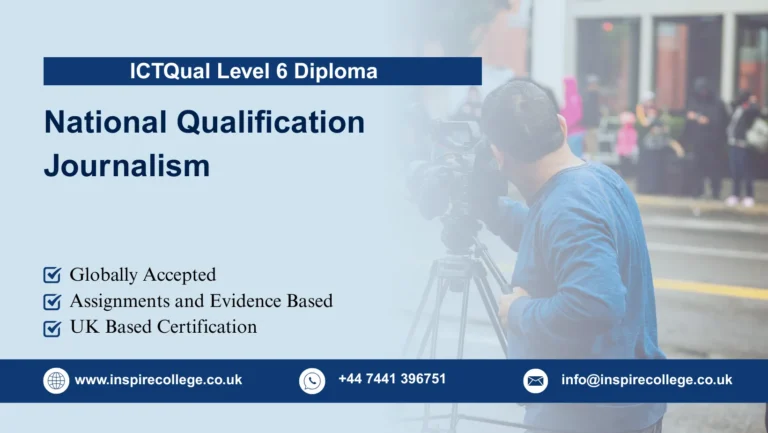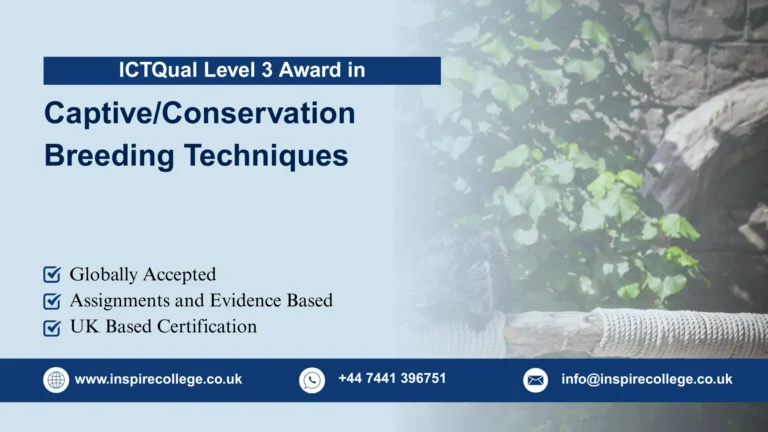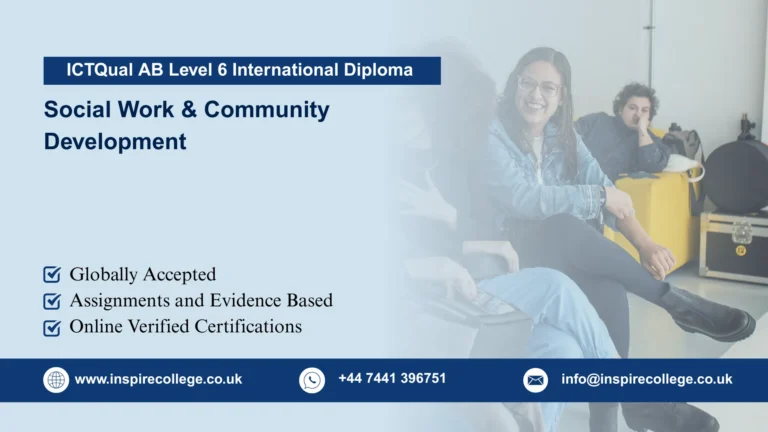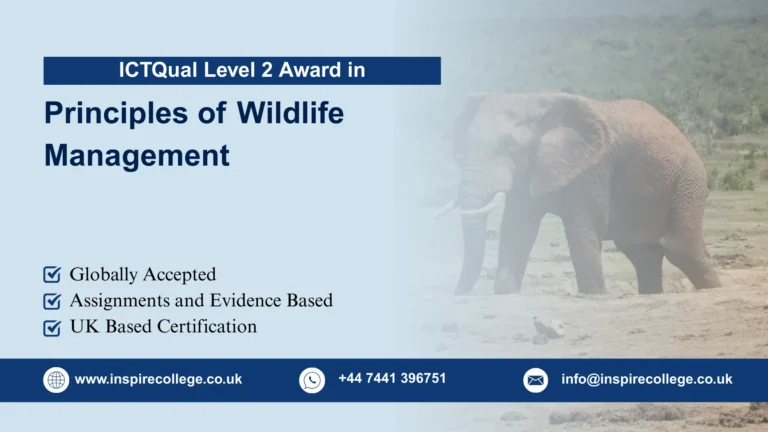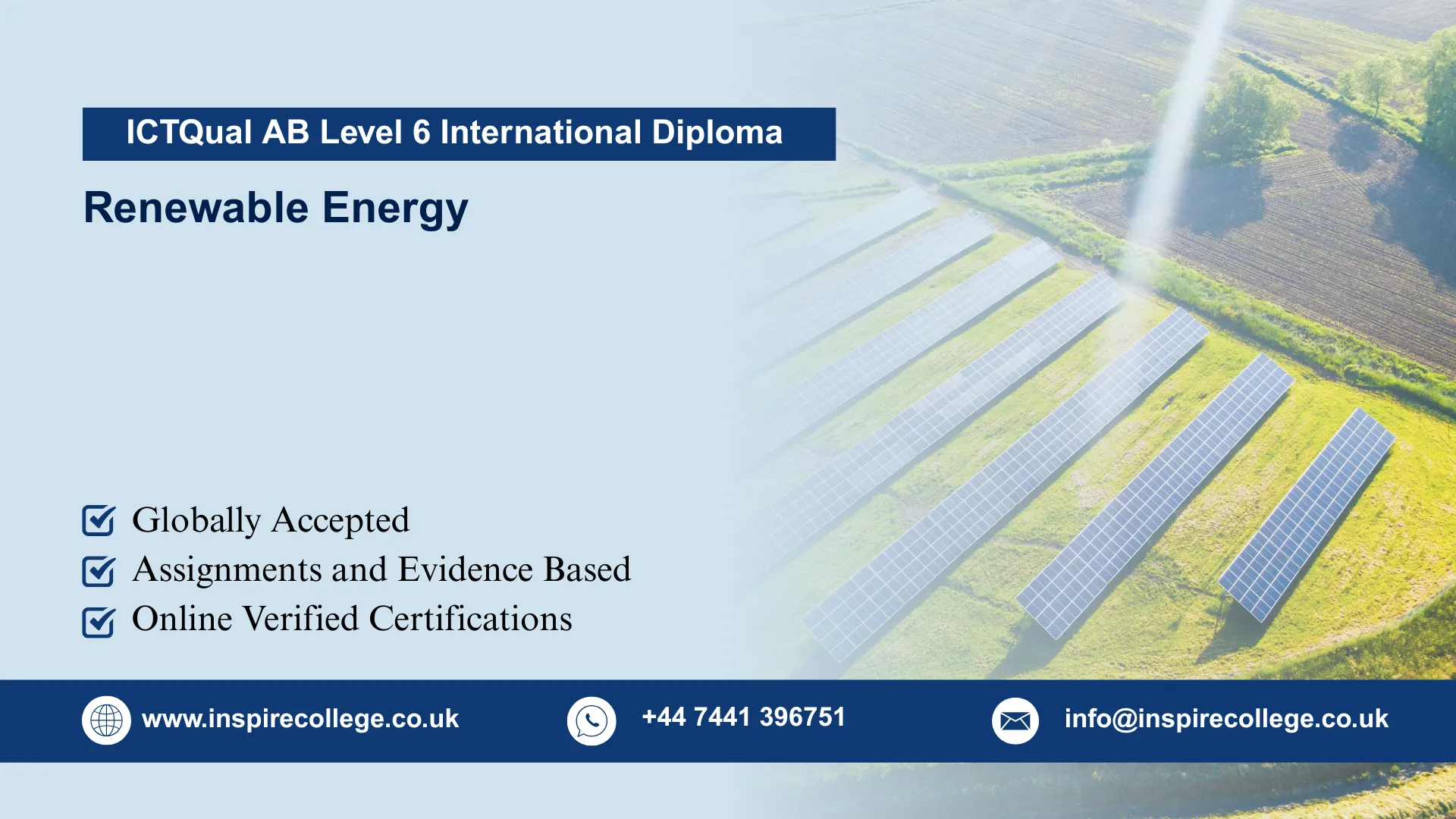
ICTQual AB Level 6 International Diploma in Renewable Energy
The global shift towards sustainability has placed renewable energy at the core of economic growth, environmental protection, and technological innovation. With rising demand for clean and efficient energy sources such as solar, wind, hydro, and bioenergy, the sector urgently requires professionals equipped with advanced knowledge and practical expertise. The ICTQual AB Level 6 International Diploma in Renewable Energy is designed to meet this need by preparing learners to contribute effectively to one of the world’s fastest-growing industries.
This three-year diploma (360 credits) is structured for both fresh learners who wish to start a career in renewable energy and experienced professionals seeking to advance their expertise. The course offers a comprehensive balance of theory and practice, ensuring that learners gain an in-depth understanding of renewable technologies and their applications across industries.
Key areas of study include sustainable energy systems, renewable energy project design and management, environmental and regulatory compliance, financial and economic aspects of renewable projects, and emerging technologies driving the energy transition. By engaging with real-world case studies, project simulations, and industry best practices, learners will acquire the ability to develop, manage, and optimize renewable energy initiatives.
Upon successful completion, graduates will be well-prepared to take on professional roles in renewable energy companies, engineering firms, environmental organizations, research institutions, and government agencies. This qualification not only provides technical knowledge but also builds leadership, analytical, and problem-solving skills—empowering learners to become innovators and decision-makers in the global renewable energy sector.
Enrolling in the ICTQual AB Level 6 International Diploma in Renewable Energy requires learners to meet specific criteria to ensure readiness for this advanced programme. The entry requirements are designed to accommodate both fresh learners and experienced professionals, providing a strong foundation for success in the renewable energy sector.
Age Requirement: Learners must be at least 18 years old at the time of enrolment.
Educational Requirements: Applicants should hold a Level 5 Diploma, Higher National Diploma (HND), or equivalent in engineering, environmental science, energy studies, or related disciplines.Fresh learners with strong foundational knowledge in science, technology, or mathematics may also be considered.
Professional Experience: (Optional)While not mandatory, learners with 1–2 years of relevant experience in renewable energy, sustainability projects, or environmental management are encouraged to apply to enhance practical understanding.
English Language: ProficiencyLearners must demonstrate proficiency in English through IELTS (5.5 or above), TOEFL, or an equivalent recognised qualification, ensuring effective engagement with course materials, assignments, and assessments.
Related Course: OptionLearners interested in further energy sector expertise may also consider the ICTQual AB Level 6 International Diploma in LNG (Liquefied Natural Gas) Technology, which complements renewable energy studies with advanced knowledge of energy production and distribution systems.
By fulfilling these entry requirements, learners will be fully prepared to undertake this three-year, 360-credit programme, gaining the technical expertise, analytical skills, and practical knowledge needed to excel in renewable energy engineering, sustainability, and clean technology roles at both national and international levels.
Mandatory Units
This qualification, the ICTQual ABLevel 6 International Diploma in Renewable Energy, consists of 36 mandatory units.
Year 1 – Foundation in Renewable Energy
- Principles of Renewable Energy Systems
- Introduction to Sustainable Energy Technologies
- Solar Energy Fundamentals
- Wind Energy Basics and Applications
- Hydroelectric Power Principles
- Biomass and Bioenergy Fundamentals
- Energy Conversion and Storage Basics
- Electrical and Mechanical Principles for Decarbonised Energy
- Health, Safety, and Environmental Awareness
- Laboratory Techniques in Renewable Energy
- Technical Report Writing
- Introduction to Renewable Energy Simulation Software
Year 2 – Intermediate Renewable Energy
- Advanced Solar Photovoltaic Systems
- Wind Turbine Design and Operations
- Hydropower Plant Design and Management
- Biomass Conversion and Biofuel Production
- Energy Storage Systems and Technologies
- Smart Grids and Energy Distribution
- Process Control and Automation in Renewable Energy
- Energy Efficiency and Management Strategies
- Environmental Impact Assessment and Sustainability
- Quality Control and Assurance in Energy Systems
- Project Planning and Technical Communication
- Data Analysis for Renewable Energy Projects
Year 3 – Advanced Renewable Energy
- Advanced Energy Systems Optimisation and Troubleshooting
- Energy Project Management
- Emerging Technologies in Solar and Wind Energy
- Advanced Energy Storage and Battery Technologies
- Smart Grid Integration and Management
- Sustainability and Cleaner Energy Practices
- Risk Assessment and Hazard Analysis in Energy Projects
- Advanced Laboratory Techniques and Field Testing
- Supply Chain and Logistics in Renewable Energy
- Capstone Project in Future Energy Technologies
- Professional Development and Leadership in Energy
- Strategic Decision-Making in Renewable Energy Operations
The ICTQual AB Level 6 International Diploma in Renewable Energy equips learners with advanced knowledge, technical skills, and professional competencies essential for careers in the global renewable energy sector. Spanning three years (360 credits), the programme ensures learners develop a solid foundation, intermediate expertise, and advanced capabilities across multiple renewable energy technologies and systems. Upon completion of each unit, learners will demonstrate measurable outcomes aligned with industry standards
Year 1 – Foundation in Renewable Energy
Principles of Renewable Energy Systems
- Explain the fundamental concepts and types of renewable energy systems.
- Evaluate the benefits, limitations, and applications of various renewable energy technologies.
- Apply principles of energy generation and sustainability in practical scenarios.
Introduction to Sustainable Energy Technologies
- Identify key sustainable energy technologies and their operational principles.
- Compare the environmental and economic impacts of different energy systems.
- Demonstrate understanding of global energy transition trends and policies.
Solar Energy Fundamentals
- Understand the principles of photovoltaic and solar thermal energy conversion.
- Apply basic calculations for solar energy generation and efficiency.
- Evaluate site suitability and system design considerations for solar installations.
Wind Energy Basics and Applications
- Explain the aerodynamics and mechanics of wind turbines.
- Assess wind resource potential for energy generation.
- Apply basic design and operational principles for small-scale wind systems.
Hydroelectric Power Principles
- Describe hydropower generation technologies and operational methods.
- Evaluate environmental impacts and sustainability considerations.
- Apply hydropower principles to small-scale projects.
Biomass and Bioenergy Fundamentals
- Explain biomass energy sources, conversion methods, and biofuel types.
- Assess environmental and economic viability of biomass projects.
- Apply fundamental bioenergy principles in practical scenarios.
Energy Conversion and Storage Basics
- Demonstrate understanding of energy conversion principles and efficiency.
- Identify different energy storage technologies and applications.
- Apply basic methods for storing and utilizing renewable energy effectively.
Electrical and Mechanical Principles for Decarbonised Energy
- Apply fundamental electrical and mechanical principles to renewable systems.
- Analyze basic circuits, motors, and generators used in renewable energy.
- Solve practical problems in energy system design and operation.
Health, Safety, and Environmental Awareness
- Demonstrate knowledge of health, safety, and environmental regulations.
- Identify hazards and implement preventive measures in energy projects.
- Promote safe and sustainable practices in laboratory and field work.
Laboratory Techniques in Renewable Energy
- Apply standard laboratory procedures to measure energy system performance.
- Analyze experimental data and interpret results accurately.
- Develop practical skills in testing and troubleshooting energy systems.
Technical Report Writing
- Prepare clear and concise technical reports on renewable energy projects.
- Present data and findings in accordance with academic and industry standards.
- Communicate technical information effectively to diverse audiences.
Introduction to Renewable Energy Simulation Software
- Operate renewable energy simulation software for basic system modeling.
- Analyze simulation outputs to optimize system performance.
- Apply digital tools to support planning and decision-making in energy projects.
Year 2 – Intermediate Renewable Energy
Advanced Solar Photovoltaic Systems
- Design and evaluate advanced photovoltaic systems for commercial applications.
- Apply energy efficiency techniques to optimize solar energy generation.
- Perform system troubleshooting and performance analysis.
Wind Turbine Design and Operations
- Analyze wind turbine design parameters and operational principles.
- Apply performance evaluation techniques for wind energy projects.
- Implement maintenance and troubleshooting procedures.
Hydropower Plant Design and Management
- Develop small to medium-scale hydropower plant designs.
- Apply operational management and optimization techniques.
- Evaluate environmental and social impacts of hydropower projects.
Biomass Conversion and Biofuel Production
- Apply conversion techniques for solid, liquid, and gaseous biomass.
- Evaluate efficiency and sustainability of biofuel production methods.
- Develop practical strategies for bioenergy projects.
Energy Storage Systems and Technologies
- Analyze energy storage requirements for different renewable systems.
- Apply battery and storage technologies to optimize system performance.
- Evaluate efficiency, cost, and sustainability of energy storage solutions.
Smart Grids and Energy Distribution
- Demonstrate understanding of smart grid technologies and energy distribution systems.
- Apply digital monitoring and control tools for energy management.
- Evaluate integration of renewable energy into smart grids.
Process Control and Automation in Renewable Energy
- Apply automation principles to control renewable energy systems.
- Use process control tools to optimize energy generation.
- Implement monitoring and fault detection strategies.
Energy Efficiency and Management Strategies
- Identify opportunities to improve energy efficiency in systems and buildings.
- Apply energy management principles to reduce waste and operational costs.
- Develop sustainable strategies for energy optimization.
Environmental Impact Assessment and Sustainability
- Conduct environmental impact assessments for renewable energy projects.
- Develop mitigation strategies to minimize ecological footprint.
- Apply sustainability frameworks in project planning and execution.
Quality Control and Assurance in Energy Systems
- Implement quality control standards for renewable energy technologies.
- Monitor and evaluate system performance against benchmarks.
- Apply corrective actions to maintain operational excellence.
Project Planning and Technical Communication
- Prepare project plans with clear objectives, timelines, and resources.
- Communicate technical information to stakeholders effectively.
- Collaborate with multidisciplinary teams to achieve project goals.
Data Analysis for Renewable Energy Projects
- Apply statistical and analytical techniques to energy data.
- Interpret data to inform project decisions and system improvements.
- Use software tools for accurate reporting and visualization.
Year 3 – Advanced Renewable Energy
Advanced Energy Systems Optimisation and Troubleshooting
- Evaluate complex energy systems for efficiency and performance.
- Apply troubleshooting methods to resolve operational issues.
- Develop strategies for system optimization and reliability improvement.
Energy Project Management
- Plan, execute, and monitor renewable energy projects effectively.
- Apply risk management, budgeting, and scheduling principles.
- Assess project outcomes against performance and sustainability targets.
Emerging Technologies in Solar and Wind Energy
- Analyze innovations in solar and wind energy technologies.
- Evaluate potential applications and scalability in industry.
- Apply emerging solutions to optimize renewable energy systems.
Advanced Energy Storage and Battery Technologies
- Design and manage advanced energy storage solutions.
- Evaluate battery performance, lifespan, and environmental impact.
- Integrate storage systems with renewable generation for optimal efficiency.
Smart Grid Integration and Management
- Develop strategies for integrating renewable energy into smart grids.
- Apply control, monitoring, and automation tools in grid management.
- Optimize energy flow and system stability for distributed networks.
Sustainability and Cleaner Energy Practices
- Implement sustainable practices in energy projects.
- Evaluate environmental, economic, and social impacts of renewable initiatives.
- Promote adoption of cleaner energy technologies and policies.
Risk Assessment and Hazard Analysis in Energy Projects
- Identify potential risks and hazards in renewable energy operations.
- Apply quantitative and qualitative risk assessment techniques.
- Develop mitigation and emergency response plans.
Advanced Laboratory Techniques and Field Testing
- Conduct advanced experiments and field tests on renewable energy systems.
- Analyze real-world performance data to improve system efficiency.
- Apply experimental findings to optimize energy solutions.
Supply Chain and Logistics in Renewable Energy
- Manage procurement, transportation, and logistics for energy projects.
- Evaluate supply chain efficiency and cost-effectiveness.
- Apply sustainable practices in energy project supply chains.
Capstone Project in Future Energy Technologies
- Integrate knowledge and skills acquired across the programme.
- Conduct independent research on advanced renewable energy topics.
- Present a professional report and demonstration of a renewable energy project.
Professional Development and Leadership in Energy
- Develop leadership, management, and teamwork skills in energy contexts.
- Plan professional growth and career development strategies.
- Apply ethical and professional standards in energy projects.
Strategic Decision-Making in Renewable Energy Operations
- Apply analytical tools to make strategic decisions in energy management.
- Evaluate financial, operational, and environmental outcomes.
- Demonstrate leadership in planning and executing renewable energy strategies.
Upon completion of the ICTQual AB Level 6 International Diploma in Renewable Energy, learners will have acquired advanced theoretical knowledge, practical skills, and professional competencies necessary to excel in renewable energy engineering, sustainable development, and clean energy management. Graduates will be fully prepared for leadership roles in energy companies, engineering firms, research institutions, and sustainability organizations globally.
The ICTQual AB Level 6 International Diploma in Renewable Energy is designed for learners who are passionate about sustainable energy solutions and want to develop advanced skills for a professional career in the renewable energy sector. Ideal candidates are those eager to combine theoretical knowledge with practical applications to make an impact in the global clean energy industry.
Ideal Learner Profile:
- Has a strong interest in renewable energy technologies, sustainability, and clean energy solutions.
- Is a fresh learner seeking a structured programme to enter the renewable energy sector.
- Is a working professional aiming to enhance knowledge, technical skills, and leadership abilities in renewable energy projects.
- Holds a background or foundational knowledge in engineering, environmental science, energy studies, or related fields.
- Is motivated to develop analytical, problem-solving, and project management skills relevant to renewable energy systems.
- Is comfortable using digital tools, simulation software, and laboratory techniques for energy system analysis and optimization.
- Seeks to understand environmental, regulatory, and sustainability considerations in energy projects.
- Is committed to professional growth and wants to prepare for leadership or strategic roles in the renewable energy industry.
- Aims to work in energy companies, research institutions, environmental organizations, or policy and regulatory bodies.
Graduates of this programme will be well-prepared to contribute effectively to the renewable energy sector, combining technical expertise, sustainability knowledge, and professional competence to drive innovation and clean energy initiatives globally.
As an approved ICTQual AB Training Centre, learners must enrol with us to undertake the ICTQual AB Level 6 International Diploma in Renewable Energy. The programme offers two distinct certification routes tailored to both experienced professionals and fresh learners, ensuring flexible access while maintaining international standards.
1. Certification Route for Experienced Professionals:
- Designed for learners with at least 6 years of verifiable professional experience in renewable energy, sustainability, engineering, or related sectors.
- Learners can leverage their prior work experience to achieve recognition for practical competencies.
- Experience-based learners are required to complete a reduced number of assessments, focusing on strategic, managerial, and project-based tasks.
- This route is ideal for professionals seeking fast-tracked recognition, while demonstrating advanced knowledge, leadership, and technical expertise in renewable energy.
2. Certification Route for Fresh Learners:
- Intended for learners entering the renewable energy field with little or no prior professional experience.
- Fresh candidates are required to complete all 36 assignments across the programme to demonstrate mastery of theoretical knowledge, practical skills, and project management competencies.
- This route ensures that learners develop comprehensive understanding and hands-on experience in renewable energy systems, sustainability practices, and emerging technologies.
- By completing all assignments, fresh learners will meet the same international standards expected of professional graduates.
By enrolling with our ICTQual AB Approved Training Centre, all learners will receive full access to course materials, expert guidance, and assessment support, ensuring successful completion of the programme. Upon meeting the requirements of their chosen route, learners will be awarded the ICTQual AB Level 6 International Diploma in Renewable Energy, recognized globally for excellence in renewable energy education and professional competence.
Register Now
FAQs for ICTQual ABLevel 6 International Diploma in Renewable Energy


